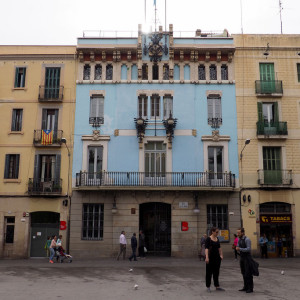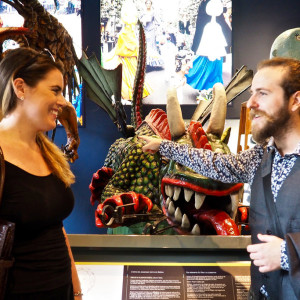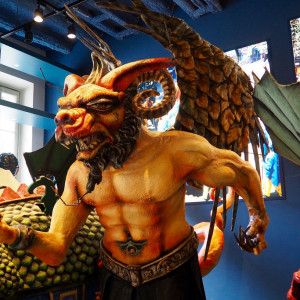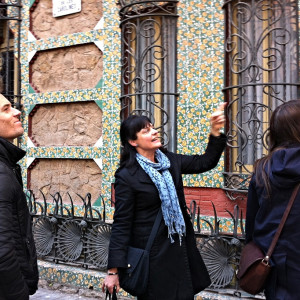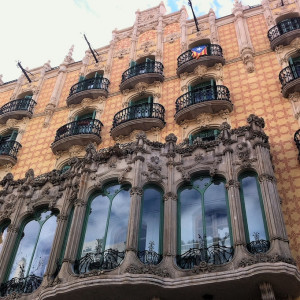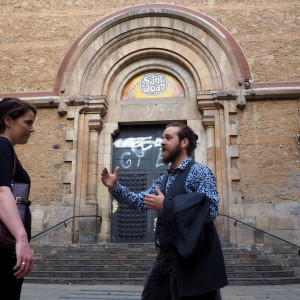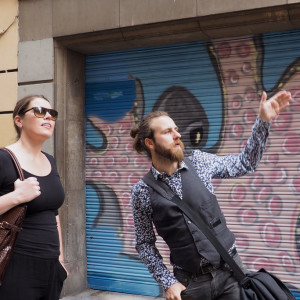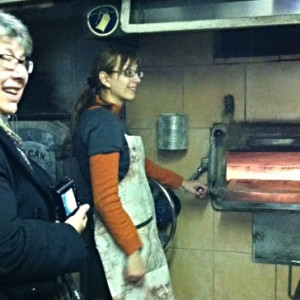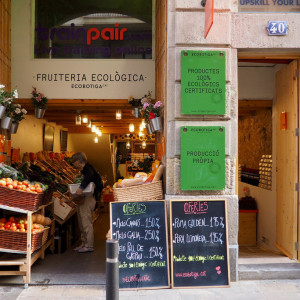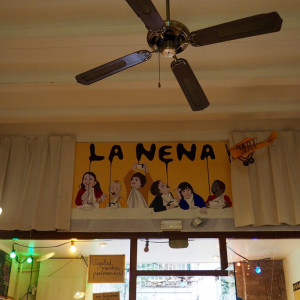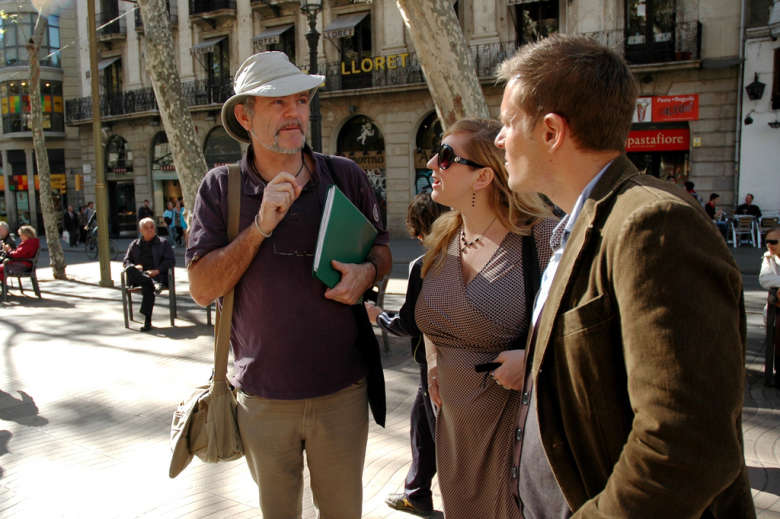Tour Details
- Duration
- 3 hours
- Product Type
- Tour
- Venues
- Gràcia
Select a date
Tour Description
The region of Catalonia is known for its fervent nationalism and strong desire for independence from Spain. You'd be hard-pressed to wander the streets of Barcelona without encountering the Estelada, the Catalan separatist flag. This 3-hour Catalan history private tour is focused on the neighborhood of Gràcia, an extremely Catalan quarter of the city. This tour will provide an introduction to Catalan culture and history, and explore the complex issues surrounding the Catalan push for independence. We'll discuss what it means to be Catalan, why many Catalans do not identify as Spaniards, and the power of the Catalan language. Along the way, we'll learn about the history of this quaint neighborhood and how it fits in within the larger Catalan identity.
Understanding Catalan Independence and Identity
The neighborhood of Gràcia once laid outside of Barcelona, analogous in a way to how the region of Catalonia lies “outside” of Spain. For centuries, the area was simply the tranquil site of the Santa Maria de Gràcia Carmelite convent. However, with the rise of wealth during the Industrial Revolution, well-off Barcelonians starting building "country homes" around the convent property. Eventually, these multiplied and other larger early-19th century buildings filled in the district. Today Gràcia, fully a part of the city, still retains its village-like feel with small squares, parish churches and narrow streets, perfect for strolling.
As we amble through the area, we will find broader clues to the Catalan identity. We will see Antoni Gaudí's first commission, the fantastical Casa Vicens, where the architecture genius first used organic philosophies and symbols of Catalan nationalism (for more on this, see our Barcelona Gaudí Tour). We will pass through Plaça de la Revolucio, commemorating the Glorious Revolution of September 1868 that deposed Queen Isabella II, underlining the rebellious spirit of Barcelona, and in particular Gràcia. In addition, underneath the square is an important bomb shelter from the Spanish Civil War (covered at greater length in our Spanish Civil War Tour in Madrid). This will lead to discussion of Catalonia's importance as bastion against General Franco. We may pass through the Plaça del Diamant, which lends its name to Catalan writer Mercè Rodoreda's iconic novel ( translated into English as The Time of the Doves), set in a troubled post-civil war Barcelona.
Catalan Culture Tour
Our exploration of the Spanish Civil War and post-war period will lead us further to discuss the Catalan independence movement and to consider recent events, such as how Catalans in Gràcia and elsewhere marked the 300-year anniversary of the loss of Catalonian independence in 2014 by holding an "illegal" referendum to regain autonomy. Three years later, the second such referendum held in October 2017 made global headlines thanks to the controversial response of the Spanish central government and the eventual imprisonment and exile of many key figures within the independence movement. What were the impulses behind this event, and what are the repercussions today? While the referendums have not been recognized by the Constitutional Court of Spain (and several Catalan politicians remain in jail for sedition and misuse of public funds), the remarkable turnout speaks volumes about the passion Catalans hold for their culture and sovereignty.
As we continue, we will pass by the homes of some famous Catalans such as rumba musician Gato Perez or opera singer Montserrat Caballé to talk about how their work figures into national identity. We may also stop by some traditional shops, particularly specialty food shops, that have been in the neighborhood for generations and are now becoming a dying breed with the increasing globalization of the city (those looking to dig further into Catalan cuisine should try our Barcelona Food Tour). We may enter a particularly ancient bodega, going back in time as we admire its dusty but charming bottles of local vermuts and wines, or a bakery known for its Catalan breads. Interacting with shop owners also allows for a brief lesson on Catalan language, its survival a testament to the power of the Catalan identity.
We finish our private Catalan history tour in front of the city hall where we can see Gràcia’s historical gigantes, or giants, enormous paper mâché figures dressed to represent the bourgeois of each Catalan village. These are usually brought out during local festivals, and seeing them provides a good opportunity for us to discuss some of the region’s lively customs.
Catalan History with an Expert
By the end of our private Catalan history tour, we'll have clarified the issues surrounding Catalan identity, and the push for independence from Spain, led by an expert guide. We will also have immerse ourselves in the customs, traditions, and language of Gràcia—a microcosm of the larger Catalan region, to better experience the Catalan spirit and identity.
FAQ About the Catalan History Private Tour
What is a private tour?
Our private tours are limited exclusively to travelers in your party. They are designed to provide a learning experience that is completely tailored to you and your traveling companions. Private tours give you more flexibility with scheduling (you decide when the walk best fits in your trip), the ability to tailor your itinerary (we'll work to match the itinerary to the interests and dynamics of your group), and more personalized time with your guide.
Is this tour walking-intensive and/or wheelchair accessible?
The general route may include narrow sidewalks and cobblestoned streets; please contact us to discuss in more detail your mobility concerns so that we can best advise. We are always happy to design a private, adapted tour for visitors with mobility concerns.
Is this tour appropriate for children and teens? We cover mature topics on this tour. It is not designed as a family tour, though we welcome inquisitive minds of all ages. Please contact us to discuss further if you're concerned about age-appropriate content.
Is this tour walking-intensive and/or wheelchair accessible?
The general route may include narrow sidewalks and cobblestoned streets; please contact us to discuss in more detail your mobility concerns so that we can best advise. We are always happy to design a private, adapted tour for visitors with mobility concerns.
Is this tour appropriate for children and teens? We cover mature topics on this tour. It is not designed as a family tour, though we welcome inquisitive minds of all ages. Please contact us to discuss further if you're concerned about age-appropriate content.
Experts
Where You'll Start
–
50 Reviews
Reviews can only be left by Context customers after they have completed a tour. For more information about our reviews, please see our FAQ.
Biel was an excellent, passionate tour guide. He explained the Catalan experience in a clear and interesting manner. Highly recommend him!
John
Oct 7, 2024
Wonderful education and history “dump” as our guide described
Elisabeth
Oct 1, 2024
Excellent tour! Josep was informative and friendly. We learned a lot about the history of Catalan desire for independence and autonomy and also had a wonderful introduction to the lovely Gràcia barri!
John
Sep 25, 2024
